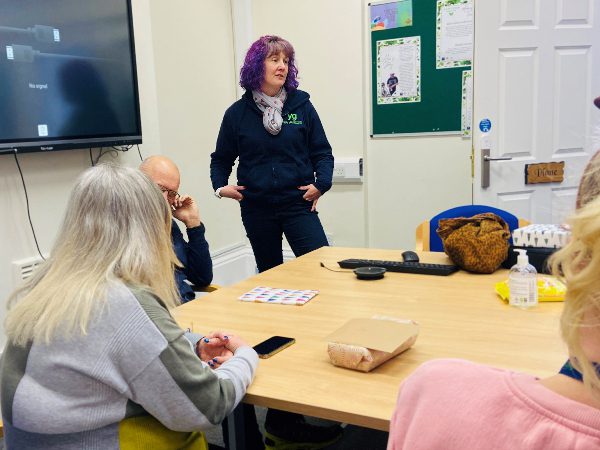
The Importance of Understanding Charity Finances
“Over the last month I have been running sessions for the staff team at YG titled ‘Understanding YG’s finances’. I had wrongly not shared the ins and outs of YG’s income and expenditure with the wider staff team before. I had assumed the team didn’t worry about where the money comes from and how an organisation like ours works as long as they are able to do their jobs. This week I learnt that not understanding how our funding cycles work and where and how the money comes from, can leave some of our team to be disenfranchised. It has made some question how management make their decisions and has led some staff to feel resentful about money being invested in certain areas and not others.
“Having been the CEO of YG for 12 years, I sometimes forget the knowledge I hold isn’t shared by others. We have grown considerably in recent years and this means I don’t spend as much time with the teams on the ground, delivering training or sharing my knowledge and experience. My role has become much bigger and I have many more challenges to contend with. I also don’t want the team to feel the ongoing pressure of generating income as their focus needs to be on meeting the needs of young people.
“However taking time out to share knowledge with the whole team is essential particularly as so much of our workforce is in the early stages of their career. Through this process I have learnt there are some essential things that our teams need to understand:
- The difference between restricted, income which makes up 90% of our income and free income. Helping staff understand that we often don’t have choices about where we spend the funding we get, the funding available to us normally comes with clear restrictions of what we can apply for and deliver.
- Understanding the difference between fixed costs and variable costs helps the team understand where we can make choices and where we can’t.
- How YG has been impacted by the cost of living increase, in just the same way as the team are being impacted helps show the additional income we need and don’t have.
- Understanding there is an expertise to balancing income, expenditure, unexpected costs and making the right financial decisions at the right time has helped staff value the our board of trustees and their knowledge in these uncertain times.
- Why a charity holds reserves and the balancing act that goes into deciding whether to spend it. Staff can see the need to use it during a crisis, like the one we are in now, but also now understand the need to have cash flow in order to run the organisation and ensure we are stable.
“I have added more workshops in for the coming weeks so those who could make it first time round will get another chance. We are encouraging all our staff to attend so they can learn more about the world they work in. Hopefully this will help the teams respect each other more, understand what management spend time doing and understand the pressures being faced at the moment.
“All of the above has highlighted how important our relationships with funders are. Being able to work together in times like these to consider how we walk the financial tightrope we are all on at the moment. Some key thought I have for funders are:
- It now costs us more to deliver what we did last year. We understand funders might not have more money but then please allow us to do less with what you give rather than expect the same as last year. This is hard to manage as our waiting lists are growing not reducing, but we need to ensure we are here for the future and not overcommit ourselves now.
- Almost all of our services are now running at a financial loss. This is because we have done right by our staff and committed to pay above the real living wage. For some staff this has meant an increase of over 10% on their salaries in the last eight months. Our fuel costs have also significantly increased. We know this is a big ask but it is essential for charities, not just YG, to receive additional income that will help us through the financial crisis. We experienced some incredible commitment from funders in Covid and ask funders to explore how we can work together again to provide similar commitments to help us through this next challenge.
- Every little helps, you will see we have developed some key relationships with local businesses and have a series of Christmas events, runs, walks and all other crazy fundraising ideas. Each of these events contributes much needed free income to invest in our funding gaps. Allowing us to ensure the most at risk young people still receive support. If you are able to please get involved; have a look at opportunities for Challenge Events, Philanthropy and Corporate Support on our website.
“Being a CEO can be a challenging role but I am surrounded by a management team who are all in it together, a board of trustees who are committed to doing right by our team and ensuring that we look after the future of the organisation, a staff team who truly believe in ‘inspiring young people.’
“This is a stressful, all-consuming and emotional time for everyone. But we must continue to work together to traverse this latest challenge and ensure we are here for generations to come.”
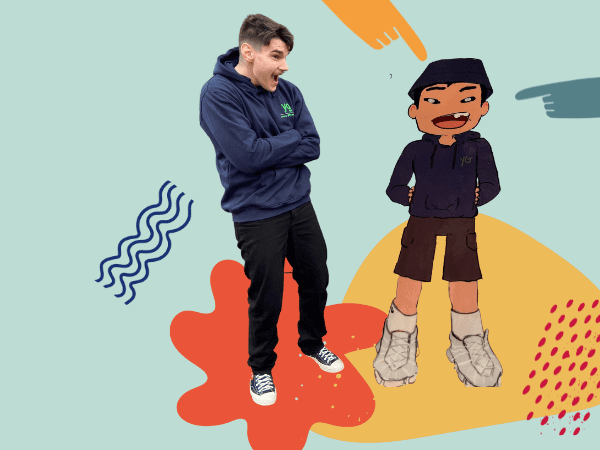
Community Youth Worker Chris Lambert talks to us about the unique vacancy he is leaving at Young Gloucestershire.
“As a kid, my school holidays were great. I spent my time playing loads of sport, going to events and spending time with my family. But for some young people this is far from their reality. Many young people live in areas that have little or no activities for them to get involved in. For many they can’t afford to get involved, or perhaps they can’t travel outside of their communities. Unfortunately some young people don’t have supportive families, or perhaps they do but they are struggling with life’s many challenges and don’t feel able to talk to their families.
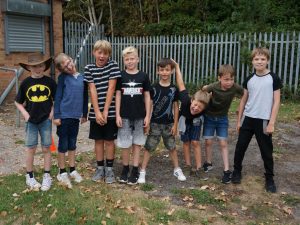
“This is where my job as a Community Youth Worker comes in. I have worked for Young Gloucestershire for over three years as part of their Community Team. Unfortunately the time has come for me to move on, leaving an exciting vacancy here at YG for a Community Youth Worker focusing on Community and HAF (Holiday Activities Fund) Projects. This is a unique role for a unique person so I thought I would give a bit of an insight into the role and the type of person it would suit.
“If any adult thinks back to their youth or teenage years they might have a mixed bag of feelings. We have all felt some kind of struggles in our lives. But for young people today there are some unique challenges that come with living in a modern world. Whomever takes this role, they need to be able to understand those challenges and be able to empathise with young people, listen to them and offer support. Sometimes providing engaging activities and free food through the HAF programme is all that’s needed to really make a difference for young people during their school holidays.
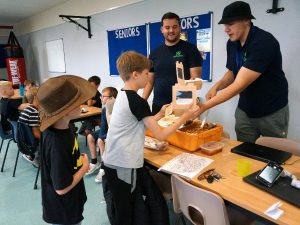
“In this job you need to be able to roll your sleeves up and get involved. Although some of the issues a community youth worker deals with may be serious, that doesn’t mean all our work has to be. You need to be able to have fun and relive some of your best childhood memories as you try and nutmeg as many young people as possible with a football or run away from them in a game of chaos tag. You need to be willing to immerse yourself in activities inspired by young people. Sometimes you have to pull on your shorts and messy trainers and just get involved.
“For some it might seem like an easy (if tiring) job of running around, but at its heart it’s all about building trusted relationships with young people. You need to be relatable, build a rapport and become a positive role model for young people. It’s a different kind of relationship than a teacher or a parent. It is one with mutual respect, non-judgmental and all about empowering young people. To enable yourself to do all that – sometimes you have to kick a ball about together first.
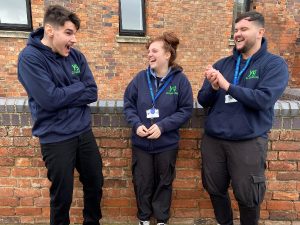
“There is also a basic need to provide positive activities for young people. A safe space for them to spend time with their friends and be comfortable. It is easy to take some of these things for granted if you are lucky enough to have them in your life already. But that is why the other part of this role is about working with stakeholders and community partners to advocate for young people and support stakeholders to understand the work we are doing. Helping them to better understand young people, to see them in a positive light and show them how they can play their part in improving the community for future generations. Many communities have suffered particularly over the last few years and this role is about bringing people together again, reinvigorating communities and bringing the needs of young people to the attention of other providers and larger stake holders
“The legacy I leave behind will be one of year round shorts and a bucket hat but I also hope it is that I have shown young people that there are people in their community that want to help. But who will come after me? You will need to be approachable, be willing to put yourself in the shoes of young people, be willing to relive your youth and help young people explore theirs. Be sensitive to the needs of young people in the modern world and be open-minded. If you can do all that, I think you are going to love this job. There
is nothing better than knowing you have helped make a positive difference in this world and had some fun along the way.”
Sound like a bit of you?
If you are interested in finding out more about this role and others visit our jobs page.
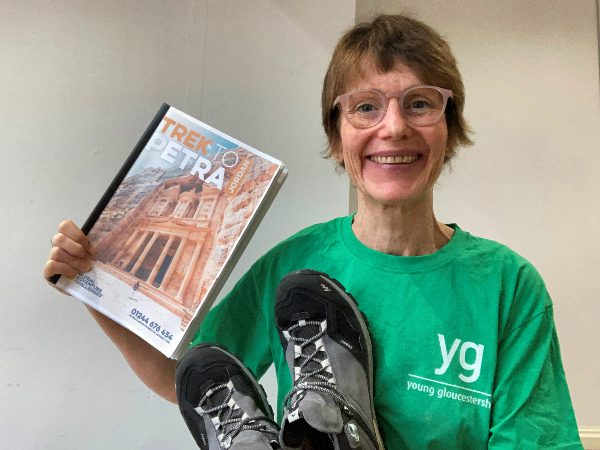
Volunteer goes to Extraordinary Lengths to Raise Money for YG.
Belinda Wilson, director of www.GlosJobs.co.uk and www.glos.info set about fundraising for Young Gloucestershire after meeting with Tracy Clark our CEO, and feeling so impressed with what the charity does with young people and our strapline “Inspiring Young People.”
Belinda decided to set her own inspirational challenge, swimming the distance of Cheltenham to Heathrow followed by a trek across the desert to Petra, Jordan. Belinda named her challenge the Bizarre Biathlon.
It took Belinda nearly four months to swim the 155km distance, equivalent to 6,200 lengths of the pool at Cheltenham Ladies’ College. Not an easy feat by any means, especially as Belinda was struck down with Covid during this time. Undeterred Belinda said she loved swimming and this part of the challenge only helped prepare her fitness ready for Petra.
“It was an utterly amazing! The hardest thing I have ever done but also one of the best. I kept thinking about “Inspiring Young People” which I had on the back of my T-shirt. The main problem was that I had injured my calf muscle before going, so I walked the whole way with it strapped and on painkillers.
“The most amazing day was when we walked 38,000+ paces up the edge of a ridge, with a total elevation of 115 storeys. It was all in the 28-30 degree heat and we were carrying at least 4 litres of water with us. At the top, Zuzu the donkey came into her own as she had been carrying the kettle on the whole trek. The guide would light a fire and make us dark, sweet tea. Just what we needed to keep us going the rest of the way. Each night we camped in a different location along the way.
“The day we walked into Petra was fabulous. It is one of the seven wonders of the world and it is easy to understand how it got that title. I am so pleased to have raised over £2,500 (including GiftAid) for Young Gloucestershire and I hope to have inspired a few people along the way. Thank you to everyone who has donated, some of whom are anonymous, so I haven’t been able to say thank you in person.”
YG are incredibly grateful to Belinda for dedicating this impressive feat to the young people of Gloucestershire and for the money that she raised to help inspiring young people. If you would like to donate to Belinda’s JustGiving page click below.
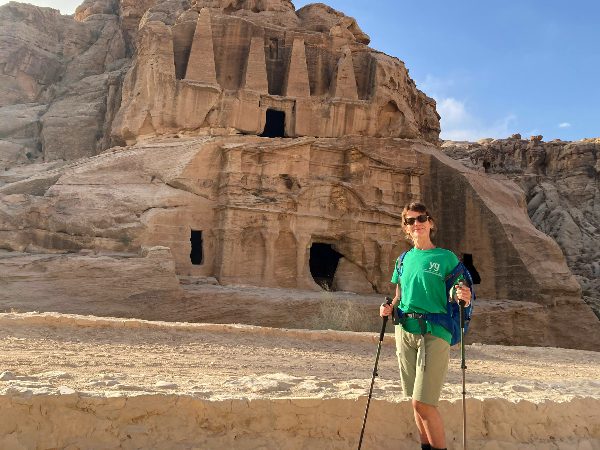
Take on Your Own Challenge
If Belinda’s story has inspired you then why not join us on one of our upcoming challenge events where you can run, walk or trek as we take on feats like the Welsh Three Peaks or may be you could be tempted by a once in a life time challenge like Belinda. Click below to find out more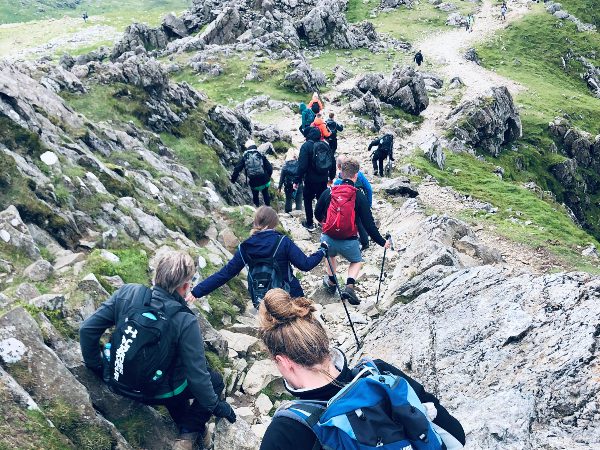
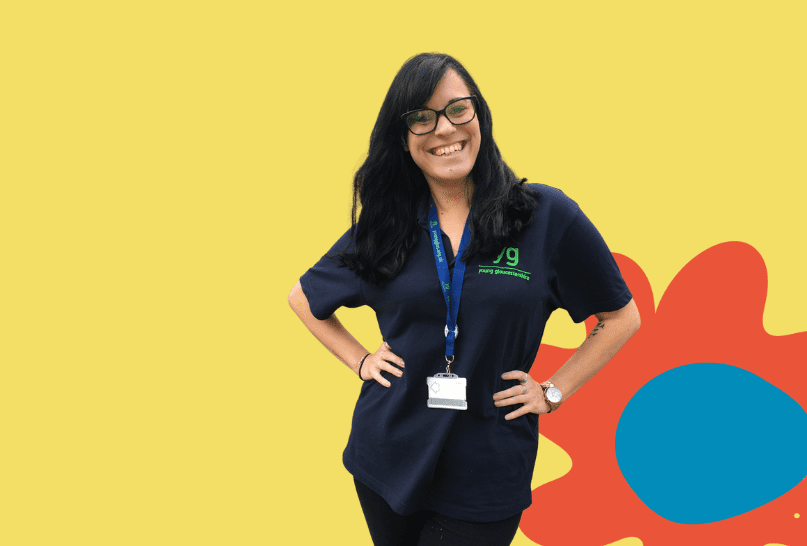
Exploring how good relationships can turn bad.
TRIGGER WARNING. This post talks about abusive relationships.
“Relationships can feel like a total mine field. No single relationship is the same and that is what can make relationships so tricky to understand. Often relationships can feel wonderful at the beginning but some can become more negative as time goes on. The young people I work with are often exploring new relationships and the ups and downs that can come along with them. I meet lots of young people who are enjoying great relationships that are supportive and loving, but there are others that are struggling to understand what a loving relationship should look like. This blog explores just that. It will talk about some of the signs of an unhealthy or “toxic” relationship and how they might not always be easy to spot.
“New relationships are generally really exciting at the start. They can make us feel like we have butterflies in our stomach. The start of a new relationship is often called the “honeymoon period”. Everything is new and exciting. You feel like you want to be with that person all the time and you feel so happy that you have a smile glued to your face so much that your cheeks hurt.
“Eventually the honeymoon can start to fade, we may move into a more stable period of our relationship where we feel safe, content and comfortable. We’ve lowered our guard and allowed this person to see all sides of us, including our vulnerabilities and our weaknesses. Unfortunately it’s a horrible fact that some partners will exploit this and you may not see that it is happening. We can be so wrapped up in that honeymoon period that we can start to lose sight of ourselves, questioning our own judgement, challenging our values and adapting ourselves in ways that we aren’t really comfortable with. In some cases this can be where negative behaviours have a chance to creep into relationships.
“Let’s talk about gas lighting. What is gas lighting? It can be tricky to spot, it is a covert type of emotional abuse where your partner misleads you, creating a false narrative and making you question your judgements and reality. The victim of gas lighting starts to feel unsure about everything in their world and even wonders if they are losing their sanity, you are made to feel like everything is wrong and it’s all because of things you have done.
“Gas lighting is subtle and can start off really small. You’ve made a decision and you’re happy with it, but then your partner asks you questions that make you challenge that decision and ultimately feel foolish for making it at all. An example might be as simple as what you’re making for dinner. You tell your partner that you’ve been thinking about macaroni cheese all day and you’re so excited to finally eat it that you rushed to the supermarket and picked up all the ingredients. When you put it down in front of them with a smile on your face, they say something that makes your heart sink “what the heck is this? Why on earth would you think that macaroni cheese is a good meal to have in the middle of the summer?” Or maybe they go further; “that’s the most stupid thing I have ever seen you do! Are you thinking straight? I’m taking a photo of this dinner and sending it to my friends, because they’re going to agree how stupid this is.”
“You feel incredibly hurt, but you also feel foolish and embarrassed. The fact that they’re telling their friends means they must be right and you must be wrong. You must be stupid, why did you think this was a good idea? This one incident leaves a little acorn of self-doubt in the pit of your stomach and if your partner continues with this behaviour, it will grow.
“What can often follow gas lighting is coercive controlling behaviour. Coercive control is any controlling behaviour; either a one-off act or a pattern of acts which takes away another person’s freedom and ability to feel positively about themselves which results in the victim feeling more dependent on the abuser.
“Because you feel that you can’t trust your own judgement you believe them when they tell you that you’re brand new outfit makes you look awful and you should change it. Or that you shouldn’t go out with your friends because they secretly hate you and your family take advantage of you. Eventually you stop wearing clothes that make you feel good about yourself. You stop doing the things that bring you joy, you isolate yourself from your friends and family until eventually the only person you have in your life is your partner.
“All of these examples are emotional and mental abuse, which on occasions can also lead on to physical and sexual abuse.
“If your relationship is starting to turn negative there will be signs you can spot. But in order to do so, you have to take time for yourself to remember who you are and your value. Perhaps stand in front of a mirror and ask yourself these questions:
- Are you isolated from friends and family?
Are you always on your own? Do you still go to the places you used to? - Are you free to do as you wish?
Do you feel like you’re able to do whatever you want whenever you want it? Or do you worry about the consequence if your partner finds out? - Do you feel supported by your partner?
When you reflect on your day do you feel good or has everything you’ve done been judged and criticised by your partner? - Does your partner show you trust and respect?
Did you tell your partner that the bus was at 10am and you’re waiting but they’re not there? They’ve just ignored what you planned and what you wanted and now you’re left feeling awful and alone. - Are you confident about who you are?
When you think of what you love, what makes you happy, have you done any of this recently? - Do you take time for yourself?
Do you show yourself self-care? Or do you feel like you don’t deserve this? - Are you always waiting for things to change or get better?
“When we’re in love, we can justify poor behaviour. We can tell ourselves that they don’t mean it, they’ve had bad previous relationships and they don’t know how to show love and that’s why they don’t trust you. Or perhaps they’re under the influence of alcohol or drugs when they behave like it, so you know it’s not who they really are. Maybe they’re nice to you sometimes, they brought you a coffee in bed this morning, so they must really love you. They’re not all bad.
“So let’s end this with going back to the beginning. Let’s talk about when the honeymoon period had ended and you cooked that fabulous macaroni cheese. When they challenged you, you knew that they were wrong and that dinner was great, you’d told people all day that you were going to cook it and no one else said what your partner said.
“This is why it is so important to always try our hardest to remain true to ourselves, especially when we start new relationships. Remember that you’re capable of making your own decisions and you’ve been doing a great job of it so far.
“If any of these negative behaviours are appearing in your relationships please talk to someone about it. A friend, a youth worker, a family member, a teacher…anyone that makes you feel safe. But when you do that, you have to listen to what they’re saying. Allow yourself to hear that you’re being treated badly and that you deserve more. That’s when you can start the journey back to yourself.
“Love should make you feel safe and happy. That’s what we all deserve.”
If this blog post has made you feel like you need to talk to someone, please reach out to us here at YG.
Or you could contact Street the Safe Teenage Relationship Education & Empowerment Team, A county wide service providing specialist support for young people, aged 13-19, who are affected by domestic and teenage relationship abuse and/or displaying harmful behaviours in their close relationships.
Call: 01452 228802
Email: STREETreferrals@victimsupport.org.uk
Or GDASS. Gloucestershire Domestic Abuse Support Service is a county-wide service designed to reduce the level of domestic abuse and improve the safety of victims and their families.
Call: 01452 726 570
Visit: www.gdass.org.uk
Email: support@gdass.org.uk
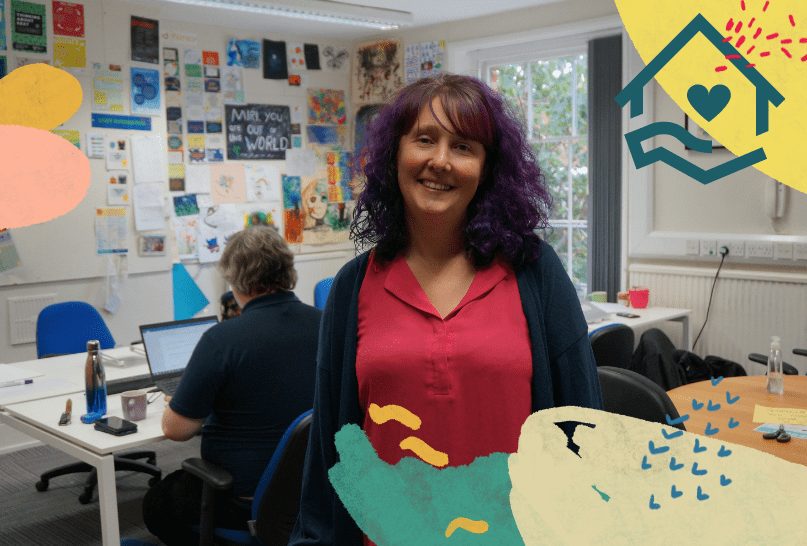
The Culture of an Organisation is it’s Heart.
“The culture of an organisation is its personality and character. Shared values, beliefs and assumptions about how people should behave and interact, how decisions should be made and how work activities should be carried out. An organisation’s culture is shaped by its history and environment as well as the people who lead and work for it. This week at YG we have been exploring our own culture.
“I set up a series of five meetings for staff from across Young Gloucestershire to talk openly about culture. The idea was to explore with the wider team how our culture impacts the way we work, the way we feel and how we do our job. An opportunity to be and reflect rather than always doing and fixing which is what a lot of our work entails. The discussions were frank, open, reflective and educational and have already started seeing a positive impact in the way we feel about the organisation since.
“We took time to remember what is good about the culture in our organisation, what we get right, what we appreciate and the impact this has. We understood that not all things work for all people and there are lots of areas in which we can improve and learn. A clear message for me is the need to educate, share and inform the teams more about how the organisation works. A clear example being that some of the staff hadn’t thought about the impact of the economic climate on YG’s finances, they had just been thinking about their own personal impact. The news that our energy bill has increased £25,000 which is the cost of a staff salary for a year, helped staff to understand some of the difficult decisions we have to make.
“As part of the sessions I shared my own story and journey creating an opportunity to understand who I am, how that influences the decisions I make and why I work for YG and Infobuzz. When decisions are being made in an organisation that you don’t understand and you don’t have a personal relationship with the person who makes them it can be easy to think they don’t care, they don’t understand and they have hidden agendas. The feedback I have received this week has shown that understanding who I am and some of the challenges, difficult decisions and compromises I have to make in my role to ensure that YG can do the best it can for young people has really helped staff understand more. Understand that they are valued even if we can’t always give the team what they want, that things aren’t always as simple as they look.
“I am also hoping it has empowered the teams to be accountable to each other and hold each other to account in creating the culture they want to work in. I can lead and set a direction of travel, but it is the teams who really create the culture, the way they respect each other, the way they respond to each other, the way they appropriately challenge, learn and grow together. I hope that the conversations we have started will continue within teams, in discussions in the pub, in discussions with colleagues and friends and that we can all continue to learn, grow and develop.
“Fundamentally I am trying to create the best environment I can to get the best outcomes for children and young people in our county. I am hoping the conversations this week will help to do that. This is the start not the end of these conversations, mixed in with them will be some education about the ins and outs of how an organisation like YG works too. If you want to reflect more on culture have a listen to this podcast it’s a good reflection of the current work place challenges around culture.”

Dealing with the cost of living crisis whilst running a charity.
“As I spent the morning working through a detailed cash flow for the organisation until March 2023, it led me to reflect on the challenges that we all now face as a sector. Covid was a challenging time with lots of extra needs in our communities. But what also came with this was new investment which allowed us to respond quickly and develop our services to meet this growing need. We now find ourselves heading towards a new cost of living crisis for our communities, the difference this time is we are also heading to a cost of living crisis for charities.
“I was told last week there are currently 150,000 vacancies in Gloucestershire alone at the moment. We find ourselves in a time where there are more vacancies than ever before, with the cost of living crisis driving salaries up. In addition to this in the last few months we have seen our gas and electric bill double (it is looking like this will happen again) many of our costs, such as resource costs, have increased by 10%, our fuel bill and mileage claims have significantly increased and back in April we awarded our staff a 4.5% cost of living pay rise to help them deal with their affordability challenges.
“Alongside all of this, our income hasn’t changed. Contracts we are delivering haven’t seen an increase in price and it is believed there will be less funding available next year and limited inflation increases. On top of this due to austerity there has been little invested in youth work training and development in the last eight years. It feels like we are heading towards a black hole. Around 85% of our spending is on staff salaries, we are a people facing organisation, which means there are few areas we can make savings to support the increasing salary, utilities and fuel bills.
“And we are not the only ones feeling the pinch. We are also seeing an increase in need in our communities, growing waiting lists of young people who require our help, support and guidance.
“The question for debate is how we meet the growing need, whilst balancing our increased outgoings and recruitment challenges? How do we continue to provide services and respond to challenges in the world we find ourselves in? When will we find ourselves losing charities/services within our communities because they can no longer survive?
“We are determined this won’t happen to us, we are increasing our fundraising efforts, we are increasing our investment in training to ensure our staff are the most skilled they can be, we are looking at the detail of our finances to ensure we are managing as efficiently as we can. We are continuing to develop services, respond to needs, and ensure that we are supporting our communities in the best way we can. We are committed to young people and families and we will continue to seek to find innovative and creative ways to meet needs.
“We are also committed to looking after our staff and will continue to seek to implement additional cost of living pay rises, appropriate expenses and training. The management team here at Young Gloucestershire and Infobuzz have been debating how we can continue to meet the high standards those who receive our services expect from us. We believe our staff team and the exceptional work they do are at the heart of it. We have implemented a whole range of steps to ensure that we are supporting, developing and enabling our staff to achieve outcomes for those we work with, this includes:
• A week long induction process for new staff to ensure everyone is given a clear and good on boarding experience.
• An internal training calendar to upskill and develop our teams, we are adding to this all the time.
• An internal management development programme to allow staff to grow and develop.
• Counselling support and clinical supervision for our teams where needed.
• Team events and activities to allow team development and growth as well as have fun together and to celebrate our successes (this includes summer and Christmas parties for the staff and or their families).
• Developing well-being zones within our buildings so staff and young people can take time out.
• Ensuring our buildings and resources are of a high standard to enable a good working environment.
• Weekly safeguarding drop-in sessions to get support with more challenging cases.
• Bi-monthly supervisions for all staff.
• Well-being action plans and discussion opportunities for staff where needed.
• Development of an equality and diversity subgroup and strategy.
• A commitment to review the impact of cost of living each year (we have provided a cost of living pay increase consistently for the last eight years).
• A commitment to pay above the minimum living wage.
“We hope all these steps, as well as the ongoing culture conversations that are taking place within our teams across the organisation, help us to continue to improve our workplace and help staff to feel support so they can be the best they can be. We hope in return, our teams will commit to do the best job they can, be passionate about the young people and families they work with and strive to hit targets which means they are getting results for young people.
“What we ask of our supporters; be patient as we battle our growing waiting lists and increasing costs. Connect us to people who may be able to support us with fundraising, people who may want to volunteer to mentor young people, people who might want to work with young people in our communities. If you want to join a team of people who are seeking to positively impact and improve the situation for others then why not take a look at our jobs page on our website.
“As an organisation we gave it our all through Covid and we will give it our all through the current financial crisis and all of your support is greatly appreciated.”

Melody tells us about what drove her to become a Mentor and how she wants to use her personal experiences to help others.
1 June 2022
“When I heard about YG’s mentoring project I thought this would be a great way for me to help young people to realise things about their life, to see things with a different perspective and to identify and understand some of their feelings. Because it’s hard as a young person. This is my chance to help someone, to give them the help and support I wish I had when I was younger.
“My own upbringing was a difficult one. I come from a family of travellers. I was dragged between the UK and France living with my half-brother and my mum and dad who had their own difficulties in life. I was brought up around drugs, alcohol and abuse. I have seen and experienced things that no child should have to.
“Through all this trauma I kept believing that there had to be a better life out there for me. Through all the dark times I have had a drive to find a better life. But there have been a few individuals that really helped me along the way.
“A teacher – who gave me her time, listened and cared. After I returned to the UK at the age of 11, unable to speak much English and not able to read or write, I would put my headphones in and shut out the world. To this day I remember Mrs Grey and the care and interest she took in me. I sensed that she had had her own difficult experiences and saw something in me. She invested extra time in me and took me under her wing.
“A support worker – who although only worked with me for a short period made a huge impact in my life. Rebecca, helped me understand my mental health, she was there for me when I experienced my own bad relationships and the birth of my son (who would ultimately change my life). She gave me a new insight to some of my feelings and behaviours and helped me to find ways to open up and to manage my mental health.
“A key worker – she pushed me, she got me going to groups for support, she taught me about well-being and self-care. Charlotte helped me see the world in a more positive light and she had faith in me.
“Throughout my life I have had many people let me down, but the support I receive from these women has stuck with me. Along with my own ingrained desire to ‘do better’ I now find myself in the position where I can pass on some of my experiences to a younger person who might be struggling with challenges in their life. I think back to what I wish I had known when I was 13. How did I want the people around me to talk to me? What could they have done to make me feel more comfortable to open up and talk about my feelings whilst making it fun? How can I make a connection with a young person, but beyond that, give them skills to cope and manage with life on their own?
“Even though mentoring is all about the opportunity to help someone else, it’s also for me. I am learning a lot to. The training has been great, I am grateful for the opportunity to learn and to increase my skills. I hope together my mentee and I will learn from each other too.”
If you would like to find out more about becoming a mentor with YG then please get in touch volunteering@youngglos.org.uk.

Melody tells us about what drove her to become a Mentor and how she wants to use her personal experiences to help others.
1 June 2022
“When I heard about YG’s mentoring project I thought this would be a great way for me to help young people to realise things about their life, to see things with a different perspective and to identify and understand some of their feelings. Because it’s hard as a young person. This is my chance to help someone, to give them the help and support I wish I had when I was younger.
“My own upbringing was a difficult one. I come from a family of travellers. I was dragged between the UK and France living with my half-brother and my mum and dad who had their own difficulties in life. I was brought up around drugs, alcohol and abuse. I have seen and experienced things that no child should have to.
“Through all this trauma I kept believing that there had to be a better life out there for me. Through all the dark times I have had a drive to find a better life. But there have been a few individuals that really helped me along the way.
“A teacher – who gave me her time, listened and cared. After I returned to the UK at the age of 11, unable to speak much English and not able to read or write, I would put my headphones in and shut out the world. To this day I remember Mrs Grey and the care and interest she took in me. I sensed that she had had her own difficult experiences and saw something in me. She invested extra time in me and took me under her wing.
“A support worker – who although only worked with me for a short period made a huge impact in my life. Rebecca, helped me understand my mental health, she was there for me when I experienced my own bad relationships and the birth of my son (who would ultimately change my life). She gave me a new insight to some of my feelings and behaviours and helped me to find ways to open up and to manage my mental health.
“A key worker – she pushed me, she got me going to groups for support, she taught me about well-being and self-care. Charlotte helped me see the world in a more positive light and she had faith in me.
“Throughout my life I have had many people let me down, but the support I receive from these women has stuck with me. Along with my own ingrained desire to ‘do better’ I now find myself in the position where I can pass on some of my experiences to a younger person who might be struggling with challenges in their life. I think back to what I wish I had known when I was 13. How did I want the people around me to talk to me? What could they have done to make me feel more comfortable to open up and talk about my feelings whilst making it fun? How can I make a connection with a young person, but beyond that, give them skills to cope and manage with life on their own?
“Even though mentoring is all about the opportunity to help someone else, it’s also for me. I am learning a lot to. The training has been great, I am grateful for the opportunity to learn and to increase my skills. I hope together my mentee and I will learn from each other too.”
If you would like to find out more about becoming a mentor with YG then please get in touch volunteering@youngglos.org.uk.

Melody tells us about what drove her to become a Mentor and how she wants to use her personal experiences to help others.
1 June 2022
“When I heard about YG’s mentoring project I thought this would be a great way for me to help young people to realise things about their life, to see things with a different perspective and to identify and understand some of their feelings. Because it’s hard as a young person. This is my chance to help someone, to give them the help and support I wish I had when I was younger.
“My own upbringing was a difficult one. I come from a family of travellers. I was dragged between the UK and France living with my half-brother and my mum and dad who had their own difficulties in life. I was brought up around drugs, alcohol and abuse. I have seen and experienced things that no child should have to.
“Through all this trauma I kept believing that there had to be a better life out there for me. Through all the dark times I have had a drive to find a better life. But there have been a few individuals that really helped me along the way.
“A teacher – who gave me her time, listened and cared. After I returned to the UK at the age of 11, unable to speak much English and not able to read or write, I would put my headphones in and shut out the world. To this day I remember Mrs Grey and the care and interest she took in me. I sensed that she had had her own difficult experiences and saw something in me. She invested extra time in me and took me under her wing.
“A support worker – who although only worked with me for a short period made a huge impact in my life. Rebecca, helped me understand my mental health, she was there for me when I experienced my own bad relationships and the birth of my son (who would ultimately change my life). She gave me a new insight to some of my feelings and behaviours and helped me to find ways to open up and to manage my mental health.
“A key worker – she pushed me, she got me going to groups for support, she taught me about well-being and self-care. Charlotte helped me see the world in a more positive light and she had faith in me.
“Throughout my life I have had many people let me down, but the support I receive from these women has stuck with me. Along with my own ingrained desire to ‘do better’ I now find myself in the position where I can pass on some of my experiences to a younger person who might be struggling with challenges in their life. I think back to what I wish I had known when I was 13. How did I want the people around me to talk to me? What could they have done to make me feel more comfortable to open up and talk about my feelings whilst making it fun? How can I make a connection with a young person, but beyond that, give them skills to cope and manage with life on their own?
“Even though mentoring is all about the opportunity to help someone else, it’s also for me. I am learning a lot to. The training has been great, I am grateful for the opportunity to learn and to increase my skills. I hope together my mentee and I will learn from each other too.”
If you would like to find out more about becoming a mentor with YG then please get in touch volunteering@youngglos.org.uk.

Melody tells us about what drove her to become a Mentor and how she wants to use her personal experiences to help others.
1 June 2022
“When I heard about YG’s mentoring project I thought this would be a great way for me to help young people to realise things about their life, to see things with a different perspective and to identify and understand some of their feelings. Because it’s hard as a young person. This is my chance to help someone, to give them the help and support I wish I had when I was younger.
“My own upbringing was a difficult one. I come from a family of travellers. I was dragged between the UK and France living with my half-brother and my mum and dad who had their own difficulties in life. I was brought up around drugs, alcohol and abuse. I have seen and experienced things that no child should have to.
“Through all this trauma I kept believing that there had to be a better life out there for me. Through all the dark times I have had a drive to find a better life. But there have been a few individuals that really helped me along the way.
“A teacher – who gave me her time, listened and cared. After I returned to the UK at the age of 11, unable to speak much English and not able to read or write, I would put my headphones in and shut out the world. To this day I remember Mrs Grey and the care and interest she took in me. I sensed that she had had her own difficult experiences and saw something in me. She invested extra time in me and took me under her wing.
“A support worker – who although only worked with me for a short period made a huge impact in my life. Rebecca, helped me understand my mental health, she was there for me when I experienced my own bad relationships and the birth of my son (who would ultimately change my life). She gave me a new insight to some of my feelings and behaviours and helped me to find ways to open up and to manage my mental health.
“A key worker – she pushed me, she got me going to groups for support, she taught me about well-being and self-care. Charlotte helped me see the world in a more positive light and she had faith in me.
“Throughout my life I have had many people let me down, but the support I receive from these women has stuck with me. Along with my own ingrained desire to ‘do better’ I now find myself in the position where I can pass on some of my experiences to a younger person who might be struggling with challenges in their life. I think back to what I wish I had known when I was 13. How did I want the people around me to talk to me? What could they have done to make me feel more comfortable to open up and talk about my feelings whilst making it fun? How can I make a connection with a young person, but beyond that, give them skills to cope and manage with life on their own?
“Even though mentoring is all about the opportunity to help someone else, it’s also for me. I am learning a lot to. The training has been great, I am grateful for the opportunity to learn and to increase my skills. I hope together my mentee and I will learn from each other too.”
If you would like to find out more about becoming a mentor with YG then please get in touch volunteering@youngglos.org.uk.

Melody tells us about what drove her to become a Mentor and how she wants to use her personal experiences to help others.
1 June 2022
“When I heard about YG’s mentoring project I thought this would be a great way for me to help young people to realise things about their life, to see things with a different perspective and to identify and understand some of their feelings. Because it’s hard as a young person. This is my chance to help someone, to give them the help and support I wish I had when I was younger.
“My own upbringing was a difficult one. I come from a family of travellers. I was dragged between the UK and France living with my half-brother and my mum and dad who had their own difficulties in life. I was brought up around drugs, alcohol and abuse. I have seen and experienced things that no child should have to.
“Through all this trauma I kept believing that there had to be a better life out there for me. Through all the dark times I have had a drive to find a better life. But there have been a few individuals that really helped me along the way.
“A teacher – who gave me her time, listened and cared. After I returned to the UK at the age of 11, unable to speak much English and not able to read or write, I would put my headphones in and shut out the world. To this day I remember Mrs Grey and the care and interest she took in me. I sensed that she had had her own difficult experiences and saw something in me. She invested extra time in me and took me under her wing.
“A support worker – who although only worked with me for a short period made a huge impact in my life. Rebecca, helped me understand my mental health, she was there for me when I experienced my own bad relationships and the birth of my son (who would ultimately change my life). She gave me a new insight to some of my feelings and behaviours and helped me to find ways to open up and to manage my mental health.
“A key worker – she pushed me, she got me going to groups for support, she taught me about well-being and self-care. Charlotte helped me see the world in a more positive light and she had faith in me.
“Throughout my life I have had many people let me down, but the support I receive from these women has stuck with me. Along with my own ingrained desire to ‘do better’ I now find myself in the position where I can pass on some of my experiences to a younger person who might be struggling with challenges in their life. I think back to what I wish I had known when I was 13. How did I want the people around me to talk to me? What could they have done to make me feel more comfortable to open up and talk about my feelings whilst making it fun? How can I make a connection with a young person, but beyond that, give them skills to cope and manage with life on their own?
“Even though mentoring is all about the opportunity to help someone else, it’s also for me. I am learning a lot to. The training has been great, I am grateful for the opportunity to learn and to increase my skills. I hope together my mentee and I will learn from each other too.”
If you would like to find out more about becoming a mentor with YG then please get in touch volunteering@youngglos.org.uk.

Melody tells us about what drove her to become a Mentor and how she wants to use her personal experiences to help others.
1 June 2022
“When I heard about YG’s mentoring project I thought this would be a great way for me to help young people to realise things about their life, to see things with a different perspective and to identify and understand some of their feelings. Because it’s hard as a young person. This is my chance to help someone, to give them the help and support I wish I had when I was younger.
“My own upbringing was a difficult one. I come from a family of travellers. I was dragged between the UK and France living with my half-brother and my mum and dad who had their own difficulties in life. I was brought up around drugs, alcohol and abuse. I have seen and experienced things that no child should have to.
“Through all this trauma I kept believing that there had to be a better life out there for me. Through all the dark times I have had a drive to find a better life. But there have been a few individuals that really helped me along the way.
“A teacher – who gave me her time, listened and cared. After I returned to the UK at the age of 11, unable to speak much English and not able to read or write, I would put my headphones in and shut out the world. To this day I remember Mrs Grey and the care and interest she took in me. I sensed that she had had her own difficult experiences and saw something in me. She invested extra time in me and took me under her wing.
“A support worker – who although only worked with me for a short period made a huge impact in my life. Rebecca, helped me understand my mental health, she was there for me when I experienced my own bad relationships and the birth of my son (who would ultimately change my life). She gave me a new insight to some of my feelings and behaviours and helped me to find ways to open up and to manage my mental health.
“A key worker – she pushed me, she got me going to groups for support, she taught me about well-being and self-care. Charlotte helped me see the world in a more positive light and she had faith in me.
“Throughout my life I have had many people let me down, but the support I receive from these women has stuck with me. Along with my own ingrained desire to ‘do better’ I now find myself in the position where I can pass on some of my experiences to a younger person who might be struggling with challenges in their life. I think back to what I wish I had known when I was 13. How did I want the people around me to talk to me? What could they have done to make me feel more comfortable to open up and talk about my feelings whilst making it fun? How can I make a connection with a young person, but beyond that, give them skills to cope and manage with life on their own?
“Even though mentoring is all about the opportunity to help someone else, it’s also for me. I am learning a lot to. The training has been great, I am grateful for the opportunity to learn and to increase my skills. I hope together my mentee and I will learn from each other too.”
If you would like to find out more about becoming a mentor with YG then please get in touch volunteering@youngglos.org.uk.
